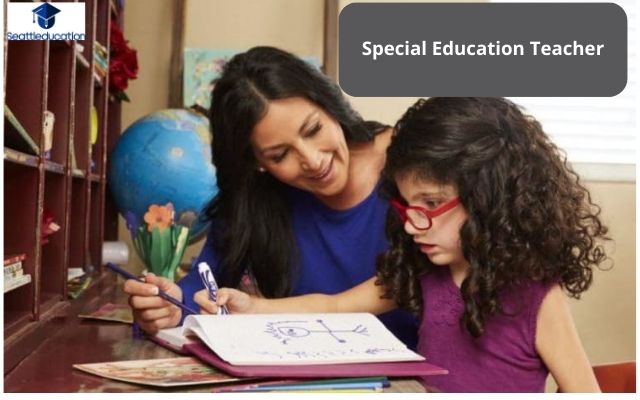Jobs You Can Get With A Teaching Degree: Unlocking Opportunities
Jobs You Can Get With A Teaching Degree: Teaching is a rewarding and challenging career. It requires an individual to be knowledgeable in many different areas, including pedagogy, subject matter knowledge, classroom management techniques, and assessment strategies.
With the proper education, individuals can find employment in various positions with a teaching degree. This article will explore some of these job opportunities for those who have obtained a degree related to teaching.
Let’s get started!
Early Childhood Education
Early childhood education is a critical aspect of preparing young learners for academic and social success. Parental involvement plays an important role in the home learning environment, allowing parents to provide extra support that may not be available at school during these formative years.

To ensure equitable access to quality instruction, early childhood educators must also consider cultural diversity when creating lesson plans and materials. In addition, digital learning tools such as websites and apps can help students develop skills while catering to their individual learning styles.
Furthermore, it is essential for teachers to stay up-to-date on best practices in order to effectively engage with students in the classroom setting. With this knowledge base, they are better equipped to promote student growth throughout the primary grades. These foundational concepts lay the groundwork for elementary school teaching.
Elementary School Teacher
Elementary school teaching is a unique job that requires a powerful combination of knowledge and skills. During the course of their work, teachers must carefully consider classroom setup, student engagement, parent communication, teaching strategies and professional development to ensure they are providing students with an environment conducive to learning.

The importance of classroom setup cannot be understated when it comes to elementary school teaching. Classroom design should promote cooperative learning and foster an atmosphere in which all children can feel comfortable participating without hesitation or fear.
In addition to this, adequate space for movement and collaboration between activities must also be taken into account when designing a functional elementary school class setting.
Student engagement is paramount in any successful instructional experience; therefore, teachers need to develop creative approaches through which students could interact with one another while maintaining focus on the subject matter being taught. To achieve this goal, elements such as differentiated instruction and active learning techniques tend to prove successful in engaging students at the elementary level.
Furthermore, open communication between parents and educators plays jobs for Retired Teachers in creating meaningful connections between home life and school activities. By utilizing effective teaching strategies along with regular professional development opportunities, teachers can create lasting educational experiences tailored towards developing successful individuals within their classrooms.
This approach allows them to stay current on emerging trends while continuing to grow personally so they may better serve their students’ needs going forward. Moving ahead, these same practices remain essential for those who wish to excel in secondary education settings too.
Secondary School Teacher
Secondary school teachers play a vital role in the development of students as they move through their adolescent years. They are responsible for providing support and guidance to help young adults reach their full potential.
In this role, secondary school teachers must be knowledgeable about classroom management strategies to ensure that educational goals can be met. Additionally, it is important for them to engage students in meaningful activities so that learning can take place.
Supporting students’ social and emotional needs also falls within the scope of a secondary school teacher’s job description. This may include working with individual students or whole classes on developing positive relationships and problem-solving techniques which will benefit them beyond high school graduation.
These educators need to have an understanding of adolescent growth and development in order to provide effective instruction for their pupils. Continuous professional growth is another key component of being successful in this field.
Secondary school teachers should strive to stay abreast of current trends and best practices regarding student assessment methods, curriculum design, instructional delivery, special education services, diversity initiatives and other areas related to teaching adolescents.
Besides keeping up with what is happening inside the classroom walls, exploring external opportunities such as attending conferences or taking advanced courses can further enhance a teacher’s effectiveness at meeting the needs of secondary school learners. Transitioning into a discussion about special education teacher requires knowledge about various forms of disabilities and how these affect learning abilities among different age groups.
Special Education Teacher
The role of a Special Education Teacher is a demanding one. It entails developing individualized education plans for students with special needs and creating an inclusive learning environment within the classroom.
Inclusion strategies must be employed to ensure that all students are given access to equitable educational opportunities. Positive reinforcement should also be used in order to help build self-esteem, secure trust, and motivate appropriate behaviors among students with disabilities.

Special Education Teachers have become increasingly involved in special needs advocacy as well. They work closely with parents and other educators to create collaborative techniques which promote success by understanding each student’s unique abilities or limitations. Additionally, they often utilize adaptive technology tools such as teaching positions for retired teachers to improve their teaching practices.
With these skills, Special Education Teachers are able to make meaningful contributions towards providing quality instruction for those with diverse challenges. They strive to support individuals who need extra assistance so that they can reach their full potential without facing any unnecessary obstacles along the way.
With this goal in mind, it is clear why effective Special Education Teaching has become essential for producing positive outcomes related to academic achievement and social development amongst members of this population group.
Aspiring college instructors would do well to consider how best they could incorporate these same principles into their own practice when addressing the needs of students inside and outside of the classroom setting.
College Instructor
College Instructors play an integral role in the education system. This position requires a deep understanding of classroom dynamics and teaching strategies, as well as excellent communication skills in order to facilitate student engagement.
College instructors must be able to come up with innovative solutions that further learning outcomes while also developing effective assessment methods for determining students’ progress. Moreover, college instructors should have strong organizational capabilities to create lesson plans and manage large classes efficiently.
The primary responsibility of College Instructors is to provide instruction on various topics outlined by curriculum standards. They are tasked with creating interesting and stimulating activities that encourage student curiosity and enthusiasm for learning.
In addition, they need to ensure that their lessons are structured appropriately so that all learners can benefit from them regardless of their academic level or background knowledge.
Furthermore, college instructors must be proficient at providing feedback regarding performance and behavior in order to help guide students towards success academically and professionally.
Overall, College Instructors serve an essential purpose in cultivating future generations of professionals equipped with the necessary skillset and mindset required for achieving personal goals and contributing positively to society.
Subsequently, it is important for prospective candidates seeking this career path to possess a comprehensive understanding of educational theories as well as practical experience related to working with diverse groups of individuals within the field of higher education.
Transitioning into the next section about Education Program Coordinators, it is vital for these individuals to demonstrate expertise in both program management techniques and instructional delivery processes alike.
Education Program Coordinator
Education Program Coordinators are requirements for high school teaching degree who develop and implement mentoring strategies, career advising services, distance learning programs, teacher training sessions, and professional development workshops.
Such coordinators oversee the daily operations of educational programs related to their field of expertise in order to ensure that all goals are met. They must be able to provide accurate guidance on how to use various educational resources in an effective manner.
Coordinators interact with a diverse range of stakeholders including school administrators, faculty members, students, parents/guardians, community leaders and other relevant personnel. Their main objective is to help develop engaging curriculums while providing support for staffs’ personal growth within the organization.
Additionally, they may collaborate with external organizations or partners on initiatives such as fundraising activities or special events. In addition to program coordination duties, Education Program Coordinators also monitor progress and make necessary adjustments when needed. This includes tracking budgets and expenditures in order to achieve maximum efficiency from allocated funds.
Furthermore, they can contribute towards planning new projects by analyzing data from past projects and making improvements accordingly. With these responsibilities combined, it is clear that Education Program Coordinators play an integral role in any teaching environment.
To transition into the subsequent section about curriculum developers: Curriculum Developers build upon this work by designing instructional materials that meet current standards.
Curriculum Developer
Curriculum Developer is a job that many teachers with degrees may find attractive. This position involves creating and revising curricula for educational institutions, as well as researching effective teaching strategies. It requires an in-depth knowledge of curriculum research, teacher training, instructional strategies, and pedagogical approaches to ensure the highest quality learning materials are developed.
Curriculum Developers must be able to work collaboratively with other professionals while having the ability to independently develop material when needed. They should also have excellent communication skills so they can effectively explain their ideas and processes to others.
In addition to curriculum development, Curriculum Developers often lead professional development sessions where they train teachers on new instructional techniques or discuss current trends in education. During these sessions, it is important for developers to remain flexible and open-minded about different teaching strategies being used within classrooms by educators across varying academic levels.
Furthermore, when leading such sessions it is essential for them to demonstrate strong organizational abilities and possess an understanding of various technological tools available in order to keep discussions engaging and informative.
As educational systems continue to evolve at increasing speeds due to advances in technology and science, Curriculum Developers play an increasingly vital role in ensuring students receive the best possible instruction through up-to-date resources available nationwide.
By developing innovative ways of introducing material into classrooms, this job allows individuals with a degree in teaching creative freedom while providing opportunities to help shape future generations’ educations—making it a rewarding career choice for any qualified individual looking for meaningful employment.
With this said, transitioning from discussing Curriculum Developer roles into Educational Consultant positions will serve as a comprehensive overview of potential jobs one can acquire with a teaching degree.
Educational Consultant
Curriculum development is a critical component of the teaching profession. In order to be successful, one needs to have an understanding of how educational systems work, what resources are available, and knowledge of effective instructional strategies.

Educational consultants provide support for teachers in areas such as informal tutoring, professional development, educational technology, continuing education, and multicultural education. Educational consultants can help teachers develop instructional plans that align with curriculum objectives and apply current trends in their lesson planning.
They also assist teachers in creating meaningful activities related to core content standards while taking into account individual learning styles. Furthermore, they often offer guidance on how best to use assessment data to improve instruction and student performance.
In addition to helping teachers plan lessons, educational consultants may play a role in designing professional learning experiences for school staff or faculty members. This could include developing workshops on topics such as integrating educational technology into classrooms or exploring new methods of addressing cultural diversity issues within the classroom setting.
By providing innovative programs and resources tailored towards specific educator needs, educational consultants can help school districts stay at the forefront of modern pedagogy.
Through this type of collaborative relationship between educators and summer employment for educators, students benefit from having access to high quality instructional materials created by experienced individuals who understand both the academic expectations set forth by governing bodies as well as the unique challenges faced by teachers working in today’s schools.
As such, it is important for those interested in pursuing a career in teaching to consider becoming an educational consultant so they can better serve their communities through increased support for educators and improved student outcomes.
With these skills under their belt, graduates with a teaching degree will find themselves equipped with yet another tool when transitioning into their next role – that of an instructional designer.
Instructional Designer
Instructional design (ID) is a profession that focuses on the development of instructional materials, resources and experiences to support learning. ID professionals are knowledgeable about theories of learning and teaching, educational psychology, pedagogy, andragogy, curriculum development, virtual learning environments, principles of effective instruction, as well as technologies for delivering education.
An instructional designer may work in diverse settings including corporate training departments, colleges or universities’ academic affairs offices, private consulting firms and government agencies.
The scope of their duties could include designing online courses or blended-learning programs; developing learning objectives; creating assessments to measure student performance; selecting appropriate instructional strategies; applying educational technology tools to facilitate learners’ engagement with content; developing professional development plans for teachers; facilitating faculty workshops; and/or conducting research related to innovation in education such as learner analytics.
The role requires strong communication skills both written and verbal along with organizational abilities to manage multiple projects simultaneously while adhering to deadlines. Additionally one must be able to develop relationships with stakeholders at all levels within an organization.
With these qualities the Instructional Designer can create meaningful learning opportunities for learners across various contexts and cultures resulting in improved outcomes.
This broad overview provides only a glimpse into the world of Instructional Designers who help shape modern-day educational practices around the globe by leveraging technological advancements and understanding human behavior when it comes to learning most effectively.
As we move forward into an increasingly digital world where more people have access to quality education than ever before it’s clear that this profession will continue growing rapidly in importance and complexity over time requiring new approaches from those involved in its practice.
By exploring how best to apply current knowledge coupled with emerging trends the field can provide effective solutions that benefit students now and into the future. Moving ahead, we look at ‘education policy analyst’ – another important job opportunity created through teaching degrees.
Education Policy Analyst
In contrast to instructional designers, education policy analysts seek to understand the implications of policies on student outcomes. They analyze data related to various aspects of educational systems such as teacher qualifications, funding sources, and diversity in teachers and students. With this information they can make informed decisions about how best to implement or adjust existing policies.
Education policy analysts consider both short-term and long-term impacts of different policies on student learning outcomes. For example, a policy analyst might study the impact of increased teacher diversity on overall student performance. The results could lead to new initiatives for increasing teacher diversity in order to improve academic achievement among all students regardless of race or background.
In addition, an education policy analyst may research alternative sources of funding for schools that lack resources necessary for adequate instruction. The work of education policy analysts is essential for ensuring quality standards in public school systems and creating equitable conditions within classrooms across the country.
Their findings are used by lawmakers at every level of government when crafting legislation related to educational issues. Those with a teaching degree have unique insights into classroom dynamics which can be invaluable when evaluating the effectiveness of current laws and making proposals regarding future changes.
Ultimately, their work helps shape our nation’s educational landscape and plays a crucial role in providing equal opportunities for all children. Given the complexity involved in analyzing data gathered from multiple levels of government, those pursuing careers as education administrators must possess strong analytical skills alongside experience working with diverse groups in order to effectively manage teams conducting research projects related to emerging trends in education.
Education Administrators
Education administrators are responsible for overseeing the activities of educational institutions. They ensure that schools and universities have appropriate staff, resources, facilities, and teaching materials to meet their objectives. In addition, they often work with recruiting teachers, provide professional development and support from teacher resources, as well as encouraging student engagement in learning experiences.
These roles require education administrators to be aware of current trends in education and local regulations that affect school operations. Education administrators must also possess excellent communication skills when working with faculty members or parents and guardians of students attending the institution.
Additionally, they maintain records related to enrollment numbers, budgets and other administrative tasks such as evaluating teacher performance or preparing reports on student progress.
Finally, education administrators will use their knowledge of curriculum design principles and pedagogical techniques to create a successful environment conducive to learning while ensuring compliance with applicable laws and regulations regarding matters like health and safety protocols or equal opportunity policies.
Conclusion
It is clear that a teaching degree can open up many opportunities for those seeking an exciting and rewarding career. With the right preparation and certification, individuals with a teaching degree can find employment in various educational settings both domestically and internationally.
Additionally, there are numerous scholarships available to assist those hoping to pursue a teaching career. All of these factors make pursuing a teaching degree a great decision for anyone looking to enter the field of education. As such, it is important to consider all options when deciding whether or not to pursue this valuable credential.






